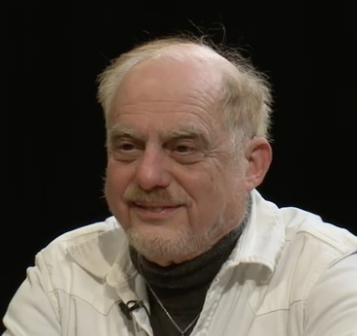
Dar Williams
“Like Marge Piercy and Margaret Atwood, Jim shows us an exciting and absorbing future world that is neither zombie-land nor un-relatable utopia. I’m a busy person, but I could not put his book down.”

Review by author Nora McKinney
What I particularly liked was that there was no clear resolution of the issues the writer puts forward: we don't reach a decision of what the best societal system is, although all the pros and cons of the different systems in his partly dystopian post-apocalyptic Earth are discussed. We know what's better, but we are also given to understand that human constructs aren't perfect, and what about AI? This grey approach (instead of the black-and-white approach people favor these days) is very much to my liking. The dangers of interconnectedness are discussed together with its merits. This book is fiction outwardly, but really it's a disquisition on societal systems.
Video Review by E.G. Stone
This week's Wednesday Reads book review is the really fascinating The Wakeful Wanderer's Guide: to New New England and Beyond by Jim Infantino.
Random Fact: I sort of want a unicycle, now.

Review by Geoffrey Dutton
Author of Turkey Shoot
What I Was Reading
About that book I didn’t want to finish: It’s a look into the future called The Wakeful Wanderer’s Guide to New New England, a 2018 novel by Jim Infantino. He’s a Boston-based musician who fronts and writes most of the material for the band Jim’s Big Ego. I bought a hard copy online from his site after noting a Black Friday special he hawked on Twitter. I took my time finishing it not because it’s bad or boring, but because it’s full of provocative speculative thinking that I needed time to ingest, a savory complement to my insipid hospital diet of clear liquids.
The Guide chronicles the adventures of Marto, a traveling storyteller making his way through 22nd- or 23rd-century New England on a powered unicycle. His entries are interspersed within text by an unnamed narrator following Marto and other characters through post-apocalyptic settlements in the northeast a dozen or so decades after “The Tide” inundated coastal cities, inciting mass migrations inland and the collapse of governments and global capitalism. Now the former US is a federated patchwork of tribes of two sorts: Luddite Traditionalists who cling to the old ethos of money and power, organized as fiefdoms; and the “Interconnected,” people sporting bionic “implants” that enable them to wordlessly “thext” their thoughts and documents to local and far-flung networked peers. [“Do you read me?”] They have evolved an economy built not on accumulated wealth, but based on personal “Merit,” essentially Brownie Points awarded by the Algorithm running the network to individuals for generous good works that benefit their communities.
What’s new about the New England locations Marto visits is the relative isolation of interconnected settlements and those of Traditionalists, former elites who have built mansions in their power bases and incite their minions to raid and subjugate Interconnected communities, whom they deride as “xombies” for their telepathic implants and do-gooder lifestyle.
Now, I’m not a sci-fi fan. The effort to conceptualize creepy alien worlds and my questioning of their premises gets in the way of enjoying a story. But, given the extreme circumstances giving rise to it, the world Infantino has built is at least vaguely possible. The Wakeful Wanderer’s Guide engagingly renders the functioning and merits of Merit as an altruistic alternative to money, predatory commodification, and winner-take-all capitalism. Not bad for a debut novel by a pop musician.
There are downsides. Eventually, Marto comes to realize that Merit is just a game, as was the capitalist system:
With the advent of virtual immersive games and social networks … the idea that everything was a game began to take subtle hold in a way that no longer seemed ironic. … What was once seen as a solid rock necessity for the civilized world gradually came to be regarded as just another game. … Our current game of status and Merit is one alternative. No doubt, if we tired of this game, we would make up another to replace it. ~ The Wakeful Wanderer’s Guide, Vol. 6, line 726
You see, while the Interconnected communities are self-administered by consensus, Merit is administered by the Algorithm, which evolves beyond any one person’s understanding of its workings, an awareness that begins to gnaw at Marto that it too could devolve to class exploitation if not well regulated. In other words, their happy Interconnected ecosystem could be hacked by those in possession of great Merit. We’ve been there before.
Being sort of a geographer, I’ve enjoyed reading the Guide for its updated descriptions of real places in New England and the Hudson Valley (most with updated names, like “Cos” for Cos Cob, CT, west of “Yale Haven,” and “Reverside,” Tarrytown NY, perhaps), and the various ways they have been rebirthed by their inhabitants with clean energy, humane animal husbandry, “vertical farming,” and more, enabled by a variety of nanotech robotic devices. (No cell phones, thankfully, as thexting has obsoleted both them and avaricious social media platforms.)
Like most speculative fiction, reading the Guide requires some suspension of disbelief—such as not asking how the Interconnected source raw materials for the groovy technologies that support their DIY economy and laid-back localities. But the vision of a quasi-utopian post-apocalyptic society that Jim Infantino advances (soon to be elaborated in a sequel) seems to summon a better crop of angels than most futuristic novels posit. Whether you’re a local or not, taking a leisurely tour of New New England with Marto—with many stops for tea—might alleviate your pessimism. Or reinforce it. It’s up to you.
[“Gather Merit and take care going forward”]

Review by Terry Kitchen
Author of Next Big Thing
Some genuinely new ideas on society in an absorbing & amusing sci-fi context
Before we even crack the book, let's talk about the title.
The bible of humorous sci-fi also of course contains the word Guide in it. But whereas Douglas Adams takes on the whole galaxy (repeatedly making the point of how insignificant our own blue planet is in the big picture), Jim Infantino's focus is narrower: the U.S., specifically New England, specifically New New England, in the not-too-distant future, when society is reorganizing after global warming and other catastrophes have undercut our current power structures. And like that other Guide, this one has a book-within-a-book, which the main character Marto composes and shares chapter by chapter during his Candide-like travels (in many ways, the best part of Infantino's novel).
The news is not all bad. Large parts of the surviving population have come together in agrarian-based sustainable communities, where transactions are based on merit rather than money. Merit is accrued via having followers and approval on social media, now internalized by implants, making speech itself obsolete. And technology has advanced so that most of the actual labor is done by tiny dedicated robots, thus avoiding the fatal flaw of past communal experiments, where everybody wants to stay up late and argue philosophy, but no one wants to get up at dawn to plant the corn. This social experiment, though, is under attack - the landed families of the past want their power and status back, and, beyond feuding with each other, want to crush and absorb the interconnected communities as slave labor.
Much of the plot involves these balance-of-power chess moves, with each side spying on the other (and Marto himself discovering his own compromised history along the way), and there's a climactic battle and aftermath as the new world sorts itself out. But, for my money, the reason to read the book is because it poses the question, does our society have to be this way, where every transaction has a dollar value, and, if not, how else could it work? Like the best sci-fi, The Wakeful Wanderer's Guide offers some genuinely new ideas to our ancient and ongoing human conversation.

David Wilcox
“I love how your book lets me see the world so beautifully / differently. It’s a powerful altered state. Freeways look so archaic! I’m also enjoying the way you gift wrap things so we can discover them. I love the subtle way you planted the sound of the song: The Age of Aquarius -within the name of the hotel. And here on page 44, I love the way you call Marto’s travels a book tour. In this future, the tour isn’t just for promoting a book, it’s for creating it. So if writing books is a real time event, then I look around the airport right now, and I see all these little tablets flashing the history of our moment as it is being written. What a lovely reframe. No matter where you go, your next coffee will of course be free because I am boosting your merit.”

Kirkus Reviews
Social media improves a dystopian future (ugh, right?) in this provocative, cyberpunk series.
Debut author Infantino launches his cli-fi series in a post-apocalyptic U.S.
Infantino sets his Wakeful Wanderer series on an Earth devastated by catastrophic climate change. Rising sea levels caused a “Great Tide,” a doomsday event that sent North America into anarchy. The poor and self-righteously angry hunted and killed the wealthy in a murder spree known as “The Vengeance.” Many of those same mobs (and some surviving dynasties) filled the power gap, ruling regions in a feudal style. An exception to the force and brutality is the “Interconnected,” high-tech humans with neural implants that link their minds at all times. Cooperative, altruistic, and empathetic, the Interconnected control sections of America’s Northeastern seaboard, especially from Boston to Tarrytown, although, thanks to their mass consciousness, they rarely need to travel. Uniting the post-apocalyptic communities, in the manner of the vagabond hero of David Brin’s The Postman (1985), is “Wakeful Wanderer” Marto Boxster. A travel blogger of sorts, Marto beams his prose directly to minds of followers as he explores neurolinked and technophobic settlements. An orphan Interconnected who considers his work a return to old-style journalism, he “writes” (and thinks directly to others, an art known as “thexting”) of his travels via motorized unicycle throughout the territories. Countless online/interactive followers learn one another’s cultures and histories through him. But the Interconnected have enemies in the form of lingering Vengeance gangs and jealous Luddite technophobes whose throwback conservative philosophies condemn these new post-humans as “xombie” abominations. Marto, while on the road, discovers discomfiting truths about himself and his origins during a conspiracy to attack the upgraded folk and return the U.S. (or what’s left of it) to “traditional” values of rule by money, violence, and slavery.
Infantino is an established musician, though only late in the narrative does he start dropping album names and song titles. Instead of this being a singer/songwriter’s dreaded side gig, the book is solid speculative fiction about transhumanist and climate issues, though by no means is it the first near-future novel to foresee a society dominated by social media (the term is never used, by the way). Via Marto and other characters, the author ruminates on the Interconnected’s progressive system of political and social economy based on “Merits” (think “likes” brought to its ultimate fulfillment) and paying it forward. The author’s evaluation of this seemingly idyllic, peaceable coexistence among those whose lives are improved by cybertechnology isn’t exactly a full endorsement of better living through science, although the bad guys enact their sinister scheme before the debates with Marto reach any sort of conclusion. Still, it’s fair to say that the Interconnected are a nicer bunch of New Englanders to inherit the Earth than their reactionary rivals. More volumes in the series have been completed, and one looks forward to more of this unsettlingly plausible world.
Amazon Reviews:
The Wakeful Wanderer series is a thoroughly different look at a possible future, and its social and economic systems. They are very thought provoking books! The second book continues the larger world plot involving the threads of many separate characters.
Sadly, I'll probably never see the Interconnected, because I'll die in the Tide or the Vengeance. Highest ratings for this offering! 😊
I really enjoyed reading this novel. People say "it's all been done before", but this story was original enough to make me question that common assumption. First book in a series (trilogy, I believe), and I look forward to reading the next one.
I was literally on the edge of my seat for most of this read. I LOVED this book. I was a reader early on, and so enjoyed being part of the conversation as the story developed. Anyone who wants to dive into the journey of how mindfulness can impact a possible unfolding future - strap your boots on! Jim is a natural storyteller and seriously knows how to engage an audience. I am dying for book two now!!!
Where does one begin? I am really blown away by the brilliance of this author. To invent a world that is at once utterly original and so fully realized, and also terrifyingly possible... it was a stressful joy to read Infantinio's book. If this is, indeed the first in a series, then —thanks God— there are some things to look forward to. I recommend this book to any science fiction fan, or truthfully, any avid reader of thoughtful fiction. Well done!
The Wakeful Wanderer’s Guide to New New England and Beyond by Jim Infantino ’83. The last book I read before this one was Alas, Babyon, an early (1959) apocalyptic book about the world after a nuclear holocaust. Two things have changed dramatically since that time: what we fear and technology. The Wakeful Wanderer reflects our more recent dread of the big wave which will submerge our cities and force those who don’t drown onto higher ground.
Jim presents us with a drastically altered America after this new reality has set in; innovation has permitted a sizable population to acquire a technologically plausible telepathy. Marto, the protagonist, sets out (first on a unicycle) with ‘followers” sharing and evaluating his adventures as he broadcasts in real time from his mind. A tribal and divided society has emerged from the disaster, which engulfed the great cities of the east coast. We learn that angry bands have punished the tycoons of the fossil fuel industries. In this still-fragmented world, Marto is rocked by questions about his own identity. The reader, like me, becomes another follower; I really enjoyed the ride.
A bit Basho's narrow road to the interior, a bit Douglas Adams and the hitchhiker's guide to the galaxy. Paints a refreshingly original idea for a new economy based on giving, trust and merit while introducing some rich and likable characters. A fun journey - and you learn a bit about New England too.
I really loved this book. Very much. And I cannot wait for part 2 to come out.
I will confess, it was hard for me to get into reading this book because of the communication style the characters use with each other. The dialog isn't written like anything you may be used to reading. Jim frames this in an interesting fashion and for me it was almost like reading a foreign language (technically I guess it is. Thexting isn't the way I speak or read, I'm not a Xombie!)
Once I got past that initial lump, and the story really started to take shape, I was immersed.
On the surface, what starts out as a simple tour guide book with Marto toodlin' aboot the NY/Southern New England area and sharing his findings with his audience turns into a massive culture war, with chaos and intrigue. The old guard wants control, money, commerce, and power; the new humans want peace and just to live and farm and love and just be.
It was a great read for me having grown up on Long Island and having spent so much of my life in the areas he writes about, imagining what the landscape would be like in the places I also wakefully wandered. Jim paints an amazing post-apocalyptic picture of towns and communities.
Finished the book while on vacation this week on the Oregon Coast. While driving down 101 from Astoria to Florence I couldn't help but imagine what this area might look like in Jim's future world, because of course the Cascadia Subduction Zone will take this entire region down when it goes. Not sure Marto would ever make it out here though, it's a long unicycle ride.
Early Readers’ Reviews
“It’s really fantastic and beautifully crafted. And I couldn’t put it down.” – S.L.
“Wow. Really cool and really really unlike anything else I’ve read that could be called science fiction or speculative writing. It’s its own thing. And I mean that in the best possible way. That’s the good news. The bad news: you better keep those chapters coming in a timely fashion or I’ll catch a flight to Boston and do my Raider impersonation.” – L.C.
“The Wakeful Wanderer has captured my imagination. The world Mr. Infantino has created is close enough to our current environment that it all seems possible in the near future. The concept of thexting and all the correspondent tech of the future is quite intriguing. And the characters are fleshed out. You know there is more to their stories than what we as readers are shown. As I understand, this is book one in a series, and I am so glad. I can't wait to find out what happens next with Marto, Helen, Reyleena, Gladys and Barnabas. Unfortunately, there are still so many questions unanswered. I look forward to the next installment!” – A.F.R.
“I blazed through this and enjoyed it thoroughly. It was familiar and transformative, and I have found myself changed because of Marto's world. Thanks for writing it. I'm glad to have had the chance to read it.” – R.M.
Other reactions
I'm loving the first book! The world that Jim has created is clever and interesting. Like Jim's music, this book is in its own category. You just cannot pigeon-hole this man. His work is unique.
-Jude P.